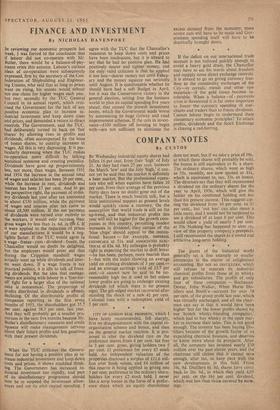FINANCE AND INVESTMENT
By NICHOLAS DAVENPORT IN reviewing our economic prospects last week, I was forced to the conclusion that if labour did not co-operate with Mr. Butler, there would be a balance-of-pay- ments crisis this autumn. Labour's curious ideas of co-operation were subsequently expressed, first by the secretary of the Con- federation of Shipbuilding and Engineer- ing Unions, who said that as long as prices went on rising, his unions would submit not one claim for higher wages each year, but two; secondly by the TUC General Council in its annual report, which criti- cised the Government for the lack of any positive economic plan to increase in- dustrial investment and keep down costs and prices, and demanded a return to direct controls. The Government, said the TUC, had deliberately turned its back on `fair shares' by allowing rises in profits and dividends, often accompanied by the issue of bonus shares, to outstrip increases in wages. All this is very depressing. It is par- ticularly depressing when the TUC makes co-operation more difficult by talking statistical nonsense and creating prejudice. Dividends have gone up proportionately less, not more, than wages. Between 1951 and 1954 the increase in the annual total of wages and salaries has been 20 per cent., While the increase in rent, dividends and interest has been 17 per cent. And to get the perspective right, the payment of ordin- ary dividends last year after tax amounted to about £330 million, while the payment of wages and salaries after tax came to about £8,500 million. If the net payment of dividends were turned over entirely to the workers, it would only increase, their gross wages by less than Is. 6d. in tife £. If It were applied to the reduction of prices of our manufactures it would be a neg- ligible factor. If the TUC would agree to a wage - freeze - cum - dividend - freeze, the Chancellor would no doubt be delighted, but the employers would point out that during the Crippsian standstill wages actually went up while dividends and inter- est went down. If a wage freeze is not practical politics, it is idle to talk of freez- ing dividends. But the idea that manage- ments are joining with labour in a 'free-for- all' fight for a larger slice of the national cake is nonsensical. The proportion of Profits distributed in dividends is alteady declining. Of the distributable profits of companies reporting in the first seven months of 1955, the shareholders got 35.7 Per cent. against 38.3 per cent. last year. And they will probably get a smaller pro- Portion in the next five months because Mr. Butler's disinflationary measures and credit squeeze will make managements nervous about their futnre profits and less generous with their present dividends.
When the TUC criticises the Govern- ment for not having a positive plan to in- crease industrial investment and keep down costs and prices, it shows muddled think- log. The Government has increased in- dustrial investment too rapidly, and part of its disinflationary programme should now be to suspend the investment allow- ances and cut its own capital spending. I
agree with the TUC that the Chancellor's measures to keep down costs and prices have been inadequate, but it is absurd to say that he had no positive plan. He had positively dearer and tighter money, and the only valid criticism is that he applied it too late—dearer money not until Febru- ary and the money squeeze not seriously until August. It is questionable whether he should have had a soft Budget in April, but it was the Conservative victory in the general election, setting free the business world to plan its capital spending five years ahead, that caused the present investment boom, which the Government made worse by announcing its huge railway and road improvement schemes. If the cuts in invest- ment—£100 million off housing to begin with—are not sufficient to eliminate the excess demand from the economy, more severe cuts will have to be made and Gov- ernment spending itself will have to be drastically brought down.
If the deficit on our international trade account is not reduced quickly enough to avoid a heavy gold drain, the Chancellor may have to eat his words about freedom and reapply some direct exchange controls. It is absurd to go on giving currency free- dom to the commodity exchanges of the City—in cereals, metals and other raw materials—if the gold losses become in- tolerable. When a balance - of - payments crisis is threatened it is far more important to freeze the currency spending of mer- chants and traders than to freeze dividends. Cannot labour begin to understand these elementary economic principles? To attack profits, dividends and the Stock Exchange is chasing a red-herring.


































 Previous page
Previous page